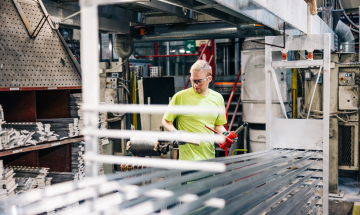Press release
Investments are necessary to increase growth and jobs
The order books of technology industries contracted slightly and new orders fell short of the previous year in the first part of 2016. Companies recruited more than 14,000 new employees in the first half of the year. Two-thirds of these employees were hired by SMEs. The turnover of technology industry companies will most likely remain at the same or a slightly lower level in the autumn of 2016 than in the corresponding period last year. Corporate taxation should be reformed so as to substantially improve incentives for investment.
The turnover of technology industry companies in Finland totalled more than EUR 68 billion in 2015. In the January-April period of this year, turnover saw a year-on-year decline of three per cent.
The companies that took part in the Federation of Finnish Technology Industries’ survey of order books reported that the monetary value of new orders between April and June was one-fourth lower than in the corresponding period in 2015, and fell slightly short of the preceding quarter. The 2015 comparison period included a major ship order.
Order books have contracted slightly throughout early 2016, but in June remained four per cent higher than a year earlier.
"Judging from order trends in recent months, the turnover of technology industry companies is expected to remain at the same or a slightly lower level in the autumn of 2016 than in the corresponding period last year," says Jorma Turunen, CEO of the Federation of Finnish Technology Industries.
The number of personnel employed by technology industry companies in Finland fell slightly between January and June. Personnel declined by about one per cent, or slightly less than 3,000 from the average number in 2015. The total number of employees was 286,000 at the end of June.
"Technology industry companies had a total of 14,000 summer employees this summer. That is a great figure," says Turunen.
Despite the overall reduction in personnel strength, technology industry companies recruited more than 14,000 new employees in January–June. Two-thirds of these employees were hired by SMEs and a third by companies with at least 250 employees. Some companies were increasing their personnel, while others were hiring new employees due to retirements and employee turnover.
Finland’s economic growth relies on exports
Even though the global growth rate is three per cent, Finnish exports have not returned to a growth track this year, either. In fact, exports have fallen short of the previous year.
"When exports don't thrive, the economy doesn't grow, either. That's Finland's problem," says Turunen.
Although the decrease in the level of exports has been felt particularly in exports of goods by industry, it has also had a significant impact on service exports. The major share of income from Finnish exports of services comprises foreign royalties and licence fees earned by the technology, forestry and chemical industries as well as software sales.
"Industry generates about 60 per cent of income from Finnish service exports," Turunen emphasises.
The decline in income from service exports by the electronics industry has been offset by software income in the gaming industry. Without the recent growth in the gaming industry, Finnish service exports would also have dropped.
Investments and productivity are decisive
As the global growth rate does not help stimulate Finnish exports, the country must resort to domestic means of improving its situation.
"Better investment incentives and other measures to improve productivity are vital for boosting competitiveness," Turunen stresses.
The low level of corporate investment in Finland is a cause for concern. Finland’s investment trend is also weaker than in the key competing countries. Companies’ productive investments in Finland are currently 22 per cent lower than in 2008, while R&D investments are down by as much as 27 per cent. The volume of investments falls below the reduction of fixed capital.
Technology industry companies invest about EUR 5.5 billion annually in Finland
"However, the current level of investment is inadequate for generating the necessary economic growth, productivity and job creation. Outlays should now be made particularly on the utilisation of digital technologies, automation, robotics and R&D. There is also a desperate need to expand production and produce new products," says Turunen.
Accordingly, Turunen hopes that in its budget session the Finnish government will take all possible steps to promote corporate investment and productivity. In addition to other measures, corporate taxation should be reformed so as to substantially improve incentives for investment.
"The Federation of Finnish Technology Industries supports the government's plans for a tax reserve model experiment for corporate taxation. Our contribution to this discussion is a study of the impacts of different corporate taxation models that we commissioned from Taloustutkimus. We hope that it will help in the preparatory work," says Turunen.
Further information:
Jorma Turunen, CEO, tel. +358 (0)500 445 444
Jukka Palokangas, Chief Economist, tel. +358 (0)40 750 5469


